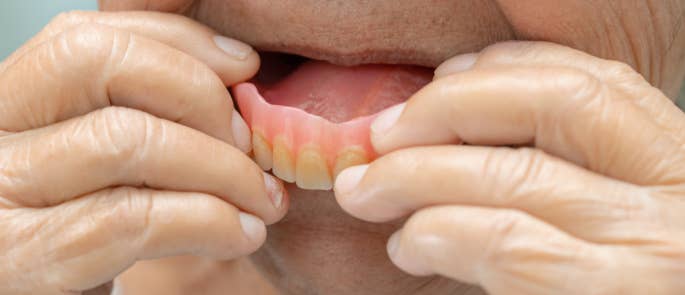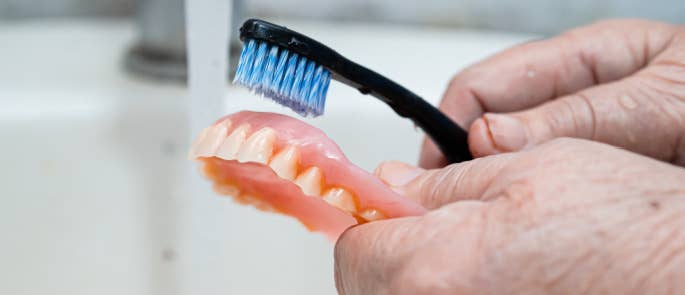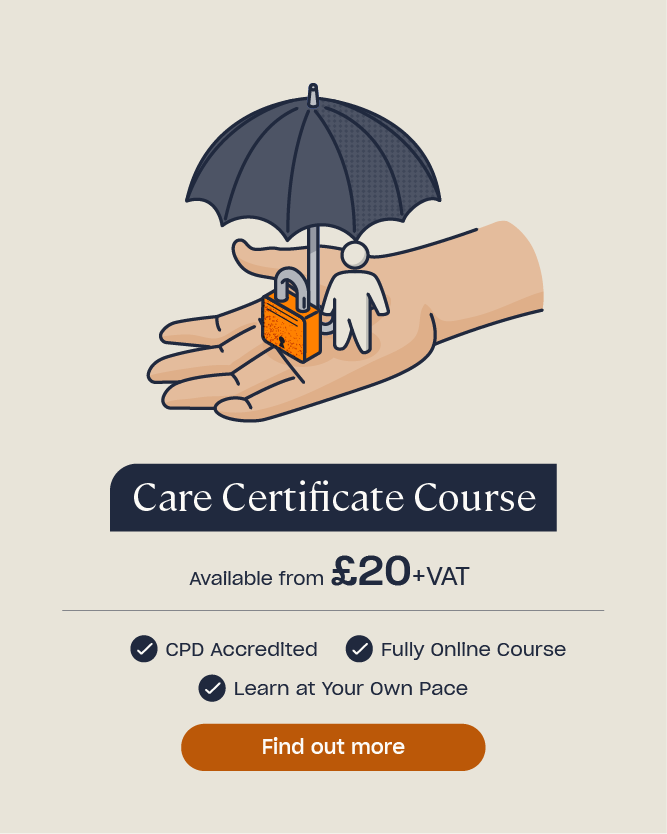How to Promote Oral Health Care in Care Homes
Oral care is the practice of keeping one’s mouth clean and free of disease or other problems. Oral health is multi-faceted and includes the ability to speak, smile, smell, taste, touch, chew, swallow and convey a range of emotions with confidence and without pain or discomfort. Oral hygiene is paramount for overall health and those living in a care environment should be cared for in a way that ensures a good level of oral health.
This article provides general guidance for those working in health and social care, as well as those with loved ones in care. It contains an explanation as to what oral health care is and its importance. Finally, there is a free template of an oral health care plan provided.
What is Oral Health Care?
Oral health care refers to the way you look after your mouth and teeth in order to keep bacteria under control and maintain your overall health. This is especially important for people in care homes, as they are at a greater risk of oral health problems.
This is due to a number of reasons, including:
- Long-term conditions that make it harder to hold and use a toothbrush, or attend appointments for dental treatments.
- Certain medicines reducing the amount of saliva produced and leaving people with a dry mouth.
- People keeping their natural teeth for longer in life, creating a need for more complex dental care than those who have dentures.
Oral health is an important part of an individual’s quality of life and an essential component of their overall health and wellbeing. Poor oral health can cause pain which can prevent people from eating or drinking and consequently, can lead to malnutrition. Oral health can also affect a person’s ability to take medication and there is evidence that links poor oral health with aspiration pneumonia, particularly in residential care settings.

People who live in care often need extra support when it comes to their oral health care. The National Institute for Health and Care Excellence (NICE) recommend that service users are supported to clean their teeth and/or dentures daily. They also state that an oral health assessment should be completed during the admission process, which should then be recorded in the individual’s personal care plan.
If you work in health and social care, it is part of your duty of care to promote good oral health care and to support individuals to do so. This is covered in the care certificate and is an important area to familiarise yourself with.
Looking to learn more?
For more information on oral health in health and social care, take a look at our Care Certificate Training Course. Standard eight covers oral health considerations including how you can support individuals with their oral health care and the risks associated with poor oral health.
Oral health care involves toothbrushing which is important throughout life. The overall goal is to achieve and maintain good oral hygiene by:
- Cleaning all tooth surfaces and the gum line, thoroughly with a toothbrush twice a day and for two minutes.
- Using a fluoride-containing toothpaste, spitting out the excess after brushing.
- Flossing daily.
- Using mouthwash to remove food particles left after brushing and flossing.
- Eating a healthy diet, limiting sugary food and drinks.
- Replacing your toothbrush every three to four months, or sooner if bristles are splayed or worn.
- Scheduling regular dental checks and cleanings.
- Avoiding tobacco use.

Importance of Oral Care in the Elderly
As mentioned, not practicing good oral hygiene puts you at a higher risk of developing serious oral conditions and diseases. Diseases include cavities, gingivitis, periodontal disease, bruxism-related conditions, cracked tooth syndrome and more.
Over half of older adults who live in care homes have tooth decay, compared to 40% of over 75s who do not live in care homes. Therefore, it is paramount that oral health hygiene is prioritised within care settings. Unfortunately, often this is not the case.
There is an urgent need to improve oral healthcare for older people, especially those living in care settings. A number of recommendations have been made by the Faculty of Dental Surgery; they are as follows:
- Key health professionals such as nursing staff, junior doctors, pharmacists and healthcare staff that have regular contact with service users should receive training in oral health.
- Social care providers should ensure staff receive appropriate training, ensure all services have an oral care policy and should include oral health in the service users’ personalised care plans.
- Advice for maintaining good oral health should be easily available for people in care settings, their families and their carers.
- Government, health services, local authorities, care providers, regulators and oral health professionals should work together to develop a strategy for improving access to dental services for those in care.
- Health and social care regulators should ensure that standards of oral health care are assessed during their inspections.
- All hospitals and care homes should have policies in place regarding oral health care.
- The government must regularly review dentistry needs as the demand for dental services will increase as the population grows and ages.
Despite the above recommendations, there is still a need for more information to fully uncover the extent of elderly oral health care and to understand the full scale of the issue. One company dedicated to improving oral health and wellbeing for all is the Oral Health Foundation, they are a charity that provide free impartial advice on all aspects of oral health directly to those who need it most.

Certain individuals may need more support than others when it comes to caring for their oral health. Below are examples of conditions and how they affect an individual’s ability to maintain good oral health:
Arthritis – pain and stiffness in people with arthritis can make brushing and flossing harder to do. Also, jaw pain can mean that sitting in a dental chair holding your mouth open during a dental appointment may not be an option. Furthermore, research has found that those with arthritis are almost eight times more likely to have periodontitis than those without. Other common oral issues in people with arthritis include mouth sores, dry mouth and gum disease.
Dementia – many people with dementia find it hard to follow an oral hygiene routine or cannot express that they have dental pain, meaning problems can go untreated. To support someone with dementia, sit with them while they brush their teeth and prompt them, give them clear, short instructions and replace their toothbrush every three months.
How to Promote an Individual’s Oral Health Care
If you work in health and social care, you have a duty to promote service users’ oral health care. Your employer should provide you with the training and knowledge needed. To check your understanding, you can ask yourself the following questions:
- Do I understand the importance of oral health and the potential effect on an individual’s general health, wellbeing and dignity?
- Do I understand the potential impact of untreated dental pain or mouth infection on the behaviour, and general health and wellbeing of people who cannot articulate their pain or distress?
- Do I know how and when to reassess oral health?
- Do I know how to deliver daily oral health care?
- Do I know when and how to report my concerns?
- Do I know how to respond to an individual’s changing needs and circumstances?
- Do I understand the importance of denture marking and how to arrange this for people, with their permission?

It is important that service users are provided with the correct oral health care. As part of person-centred care, all individuals should be encouraged and supported to practice good oral health care.
Oral Health Care Plan Template
In care settings, thorough assessments and support from skilled and knowledgeable staff can help prevent the pain, disturbed sleep and health problems that poor oral health can cause. In order to tackle the bigger problem, small changes and adjustments to a service user’s daily routine can make a huge difference.
To support service user’s daily mouth care, you can:
- Prompt or support them to brush their natural teeth twice a day with fluoride toothpaste.
- Prompt or support them with using toothpaste.
- Prompt or support them to clean their dentures.
- Use their choice of toothbrush and mouth care products.
Another important part of promoting good oral health in care homes is training staff to be able to recognise when to reassess a service user’s oral health. Completing regular assessments helps to easily monitor oral health and should be done, as standard, for every service user when they move into a care home and then recorded in their care plan.

To create an oral health plan, start by asking the service user questions such as:
- How do you usually manage your daily mouth care and what help would you like?
- What dental aids do you currently use? For example, manual or electric toothbrushes, mouthwash, floss.
- Do you have dentures, and if so, are they marked with your name? If not, would you like them to be marked?
- When did you last see a dentist, and who did you see?
- If you don’t have a dentist, would you like help to find one?
We have discussed the various ways in which oral health care can be promoted in care settings to improve service users’ overall health. Here we have provided a free template of an oral health care plan for you to use when assessing a service users’ oral health.
The template includes checks of: the lips, dental pain, natural teeth or dentures, gums and tissues, the tongue, the saliva and oral cleanliness. It also covers further steps that can be taken, should they apply.
It is recommended you print out this plan and fill it out for each service user and store it with their care plan. This template should be used as an assessment tool for identifying the need for further intervention from dental professionals, it is not sufficient to fill this out without taking further steps to care for an individual’s oral health.
Oral health care is crucial in health and social care settings to contribute to overall health and wellbeing. Regular oral health care, dental assessments and dental appointments are needed to prevent tooth decay, gum disease and other associated conditions. Care providers should ensure individuals have their own oral health plan in place and staff should receive training to ensure they can support service users with their oral hygiene.
Further Resources:
- What is Person-Centred Care?
- Basic Life Support Training
- Care Home Risk Assessment: Free Template
- Activities for Care Homes: Free Planner and Ideas
- How to Deal with Resistance to Care
- Introduction to Safeguarding Adults Training Course








